The Memoir
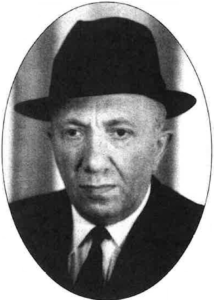 by Rabbi Leib Geliebter, Z”L
by Rabbi Leib Geliebter, Z”L
Translated from Yiddish by Yaacov Dovid Shulman.
The Pre-War Mood
The year 1939 (5699), when the Second World War broke out, may be considered the most sorrowful year of Polish Jewry. At that time, black clouds
began to gather on the Jew ish horizon and it was obvious that a storm was soon to come.
Hitler’s invasions of Austria and Czecho slovakia had terrifled Poland. Opinions were split. Some held that these invasions would not lead to war, for Hitler would not dare start up with the entire world. Others held the opposite view: that the fa natic dictator planned to rule the world, and that in his megalomania he believed that Germany’s might was much more powerful than all the opposing European powers combined.
But most people refused to believe that the pessimists were right. They didn’t want to believe that a war was about to begin. And the Jews were no more worried than the general populace. No one could imagine that if the Germans took over Poland, the Jews would be threatened with total annihilation. If they would have had the least suspicion that such a thing could happen, a great number of Jews could have been saved, for they would have used all means, legal and illegal, to escape Poland.
Then, at the end of August, when news of the Ribbentrop-Molotov pact be came known, people began to worry. It was clear to everyone that war could break out at any moment. Everyone was frantic. People began hoarding food, there was a general inflation, a black market developed, and the panic increased.
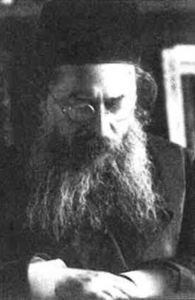
The Outbreak of the War
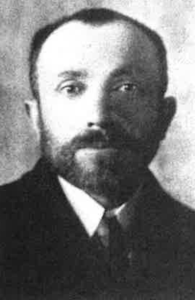
On Friday, September 1, 1939, at five in the morning, the Germans began a general bombardment of Poland from all directions. Many people in all the Polish cities were killed. ln Plotzk, the air strike targeted the Warsaw city gate and the military barracks. But the first to be hit was the civilian population.
All of Poland was overtaken by panic and confusion. The government began to mobilize its reserves, but neither enough uniforms nor supplies were ready In general, the Polish army’s equipment was outmoded . and old-fashioned. Poland did not have any modern weapons. The cannons were pulled by horses, and infantry went by foot, according to the old custom. The bulwark of the Polish army was its cavalry.
In contrast, the German army was entirely mechanized and equipped with the latest, most technologically advanced weapons. Even though Poland was being overrun from all sides a and Germany’s treachery was meeting no organized op position, Polish Field Marshall Ridz Shmigli [sic] kept insisting to the last minute that Poland would not give up an inch of land. Germany’s lightning strike against Po land lasted no more than three weeks. Then Poland fell.
Flight to Gambin
A rumor spread throughout Plotzk that as soon as the Germans would enter the city, they would massacre all the Jewish men. As a result, most of theJewish men fled to Gambin.
I, my father, R’ Moshe Mordechai Geliebter, Rabbi Mordechai Dovid Adelberg, and thousands of other Jews walked to Gambin. The crowding in Gambin was indescribable. There was simply no place to stay overnight. People slept in the cor ridors of houses, in synagogues, in battei medrash, and so on.

In the end, conditions in Gambin became much worse than those in Plotzk. Gambin was bombarded with incendiary bombs, and many Jews were trapped in bunkers and burned alive. In the house of the Tibers, thirtyJews were killed at once in bunkers, buried alive. We ran from house to house looking for protection from the bombs. The town was almost entirely burned down.
On Rosh Hashanah, we made a minyan, but we had to flee in the middle of the prayers. I had borrowed a tallis from R’ Simchah Shikenkah. The following week, when I wanted to return the tallis, I learned that the entire Shikenkah family had been burned to death in their house.
After a week of hunger and deadly fear in Gambin, we returned by foot to Plotzk. The road led though a long forest filled with many dead Polish soldiers. Jews were grabbed and forced to bury the soldiers, and they recognized many Jews among them.
When we came to the Plotzk bridge, we had to avoid it, for it was mined. We had to wait an entire day until we succeeded in ferrying across the Vistula. Returning to Plotzk, we saw that the city was unharmed. The rumor that the Jews would be massacred had been created by German spies.
The Nazis’ First Step Against the Jews in Plotzk

As soon as the Nazis entered Plotzk, the SS took hostage the wealthy and socially-active Jews, the “zaklandikes.” After these Jews suffered torture and the threat of death, they were ransomed by the community.
One of the first German acts against the Jews was the confisca tion of Jewish property. Stores, factories and workshops were sealed shut. At one blow, all Plotzk Jewry became impoverished.
After that, the Nazis systematically began their pre-meditated, devilish plans. Decrees were enforced one after the other. At first, those who lived on Christian streets were given ten minutes to move out and not allowed to take any thing with them. The next order was for Jews to leave the finer houses within minutes. Whoever did not leave immediately was beaten without mercy.
When a Jew went to sleep, he was not sure that he would awaken the next morning, for many Jews were roused from their beds at night and never seen again.
By special decree, a Judenrat and a Jewish police force were formed. The function of the Judenrat was to administer German commands with the help of the Jewish police. Dr. Bomberger was chosen as Judenrat president and Temuel Shatanas as vice-president.
The Jews were forced to report daily to the police for all sorts of difficult forced labor. Many times, instead of being taken to work, the Jews were brought to the Malachavianka garrison, where they were tortured and beaten in order to satiate the Nazi soldiers’ bestial instincts.
One time, several SS men entered the communal office and demanded that the secretary, Binyamin Yagada, immediately assign them ten young people to engage in forced labor in the Malachavianka [garrison] where they were stationed. It goes without saying that their demand was immediately met. I was among those ten young men. First, they searched us. Then they took us to their devilish, tormenting work. They scratched Stars of David on our chests with their razor-sharp knives. Then we were put in barrels, which they rolled across the entire courtyard. We were beaten with sticks over our heads and across our entire bodies. We went there healthy and returned beaten, our faces swollen and bruised.
Another time, two gendarmes and a volksdeitsch roused me and my father, R’ Moshe Mordechai Geliebter, from our beds after midnight, and took us to the police station. I was brought before the Commandant, who told me that since I am a bank official, I must give him the names of the wealthy Jews. He gave me one minute to reply – if I would not answer, he would have me shot.
I decided to say nothing. Better to suffer myself than to condemn Jews, heaven forbid. When they saw that I was not talking, they began to torture and beat me. They stood me facing the wall and said that they were going to shoot me. I recited Viduy. Miraculously, they let me go and I went home, broken and beaten.
After this experience, I had to lie in bed for six weeks. Dr. Feinberg came to me. When he saw me, he wept and naively asked why they had beaten me. I replied, “Because I am a Jew-nothing else.”
Plotzk-a City of Refuge
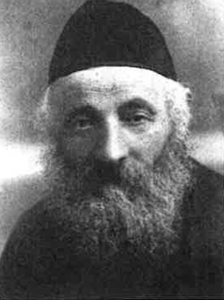
Geliebter, Paternal Grandfather of Reb Leib
A month after the outbreak of the War, the Germans expelled the Jews from all cities that were close to the German border. The first victims were the Jews from Dabzhin, Nod, Dreventza and Rufin. They came to Plotzk impoverished, with nothing. The wealthy men of yesterday today were poor, for they weren’t allowed to take anything with them. Hundreds ofJewish families with small children, old people and sick people, came to Plotzk. A committee was immediately formed to help the refugees find lodging. Every resident had to take in a family or at the least one person. The refugees also received food and clothing.
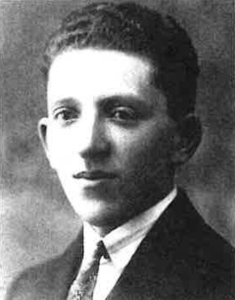
Plotzk’s Jews showed the refugees extraordinary compassion and literally shared their food with them. They said, “That which happened to the refugees today can happen to us tomorrow.” The refugees used to come with wagons down Broad Street to the beis hamedrash. At first, they were quartered in the two battei medrash. Later on, they stayed with private individuals.

People simply did not want to believe the horrible things that the refugees told about how the Germans in Rufin had murdered the zaklandikes, the community figures and wealthy Jews. They told us that the Nazis had arrested the most prominent people of the city, who were never seen again.
They said that a peasant who came to Rufin had told them that all the zaklandikes had been shot in a forest not far from the city. The peasant had recognized the boots of R’ Yisroel Luksemburg, who was a member of the community administration, a young man, a Torah scholar, and a man of good deeds with a sensitive heart. The peasant had seen his boots sticking out of the ground, where he had been half-buried.
The Plotzk Jewish population was now increased to ten thousand people.
The Ghetto in Plotzk
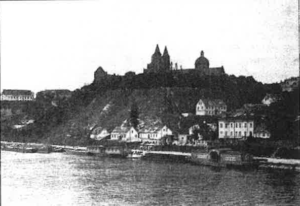
On the night of April 30, 1940, the ghetto in Plotzk was surrounded by police and German gendarmes. When the Jews learned of this in the morning, there was a great outcry. They understood that they could now expect the worst. The Germans announced that whoever crossed the ghetto borders would be immediately shot.
The crowding in the ghetto became terrible. There were almost ten people to a room. Diseases began to spread and the mortality rate was very high. There was simply no place to put the sick; and besides that, there was a lack of medicine.
The men who were taken to forced labor, recruited by the Judenrat according
to the Germans’ orders, were not certain if they would return from work.
The Gestapo made ceaseless inspections in the Jewish houses, robbing whatever the Jews had managed to save. These raids would usually take place at night. The Germans would order everyone to get out of their beds and then ransack the house. One had to give them every thing: money, gold, silver and jewelry. Woe to a person in whose home something illegal was found.
At night, the Jews would long for the day; during the day, they would long for the night.
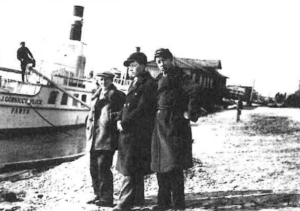
In the daytime, no male appeared on the street, for the German “angels of destruction” would grab people for work, and many who were taken never returned.
The Germans would take the Jews to do the hardest work, such as cleaning up entire mountains of sand at the Vistula, loading them on trucks and [illegible] Jewish houses.
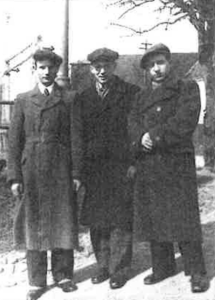
Many fines were levied against the Jewish community. Jews had to give away jewelry and ornaments that had been in their families for generations.
Poles had the right to enter the ghetto. They would bring in food, for which they received the highest prices. Whoever was unable to pay with money paid with clothing, bed linen, jewelry and even the shirt off his back.
A German commissar was chosen as liaison man between the Gestapo and the Judenrat. The Judenrat distributed food to the Jews by a head count. This food was distributed once a week. Cardboard was also distributed, to be used as tinder [in place of firewood]. Women would freeze, standing in line for long hours, until they received the cardboard with which to warm their homes. The distribution of wood was minimal. People were forced to tear out doors and windows and burn them for warmth.
The Tragic Parade
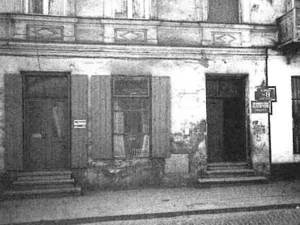
Since the battei medrash were closed and Jews wanted to pray together, they would make illegal minyanim in private homes-under the strictest secrecy, for all gatherings were forbidden. During a police raid on Gradzka Street, the SS found a few minyanim of Jews davening in the home of the gabbai of the Gerrer shtible, R’ Meir Cohen.
The German criminals ordered all the Jews outside in their tallis and tefillin, and they forced the Jews to march through the Christian streets, led by someone carrying a Sefer Torah.
The Nazi sadists did not satisfy themselves with their war of extermination against the Jews. They also wanted to attack the Jewish faith and mock that which was most precious and holy to the Jewish people.
The False Accusation
In the late hours of a cold, winter night, Gestapo soldiers entered the house of “Tall Yehoshua,” may he rest in peace, no Nyetzale Lane to carry out a search and rob the Jewish families in the house.
Since the steps in the old home were winding and the Gestapo soldiers were dead drunk, one of them slipped and was slightly injured.
The next morning, the Gestapo returned and arrested all the Jews in the house – 25 people – on the pretext that the Jews had caused the accident. Those arrested were sent to the death camp Dzialdava, where they suffered terrible torments.
These 25 victims were not enough for the Nazi murderers. They carried out a second raid in the middle of the night and took away another 100 Jews from Nyetzale Lane and other locations. They loaded them onto cars and sent them off to an unknown destination.

The First Expulsion
Once, a rumor ran through the ghetto of secret news that the following day the Plotzk ghetto would be liquidated. The Jews packed their things and waited on the road. But the next day, it turned out that the rumor was not true – the Germans themselves had spread it to confuse and upset the Jews.

But a month later on a Friday night, on February 20, 1941, at three o’clock in the morning, the SS swept through the ghetto. With their rifle butts, they broke doors open and chased all the Jews onto the street: men and women, children and babies, old people, the sick and weak everyone, without exception. They allowed no one to take anything along. Whoever grabbed a package was beaten mercilessly and forced to leave it behind.
The Jews were beaten over their heads and chased through the streets until they came to the great square. Here approximately ten thousand Jews were lined up in rows, ten to a row. The frost was bitter and people were frozen from cold. Many fainted and died of fright. They fell in the deep snow and their bodies were left in the street where they had fallen.
All the Jews were then packed like herrings into large trucks. Whoever did not have the strength to step up into the tall truck was beaten until he was unrecognizable. The other Jews worked to pull the weak Jews into the trucks in order to save them from the Germans’ murderous hands.
The Jews who stood in the rows and waited to be packed into the trucks were not allowed to move from their place They stood in the frost without eating and drink ing. Parents were separated from their children – it was forbidden to go from one row to the next.
In the car into which I was pushed was my friend R’ Zalman Dovid Rubenstein. When they also packed in his wife and children, he went wild. Not taking heed of the danger which threatened him, with great feeling, he began calling on the Jews to fight back. He argued that we can imagine where we are going, so why should we allow our selves to be led like sheep to the slaughter? What did we do, what was our sin? Why did we deserve such a fate? And what was the guilt of the youngsters, the school children and the nursing babies?
It was a miracle that the Germans didn’t understand him. If they had, all of us would have been killed on the spot.
When the Germans finished packing us in, they slammed the latch, and the truck began to move. None of us knew where we were being taken.
The Jews of Plotzk weren’t able to enjoy the food and chulent that they had prepared for Shabbos – and which was ruined, together with the Jews. This was the last holy Shabbos for the Jews in Plotzk.
In the Death Camp, Dzialdava
On the way, we passed though various towns and villages. We went through Mlava and through theJewish ghetto, where Jews still moved about. They greeted us with a “Good week” and asked us where we were being taken to. We could see in their expressions their pain and worry for our fate.
Many wanted to jump down, but this was impossible. On every truck, SS soldiers travelled holding machine guns. In this way, we were brought to Dzialdava.

Before the camp gates in Dzialdava, the Germans unloaded us from the trucks, hitting us with billy clubs. Then they told us to run through a small door. On both sides stood Gestapo soldiers holding rifle butts over our heads. They chased down the Jews. People fell from the blows and a mountain of people was formed. If anyone managed to bring something along with him, he had to abandon it before the door.
We were chased into dark barracks where we lay frozen on horse manure, on the cement floors. The weak and the sick cried out, but it was impossible to save them. Many died and were buried un der the outhouse. Whoever did not believe in hell could have seen it there….
And as regards those five thousand Jews who had come to the camp before
us, it is impossible to imagine the torments that they experienced. They longed for death if it would only relieve them of their terrible agony.
The Germans didn’t treat Jews like people, but crushed them as though they were worms. That German nation of murderers cast away from itself the human image of G-d. No one can imagine the totality of the sadistic cruelty that the Nazis inflicted upon the Jews of Plotzk in that hell on earth called: Dzialdava.


